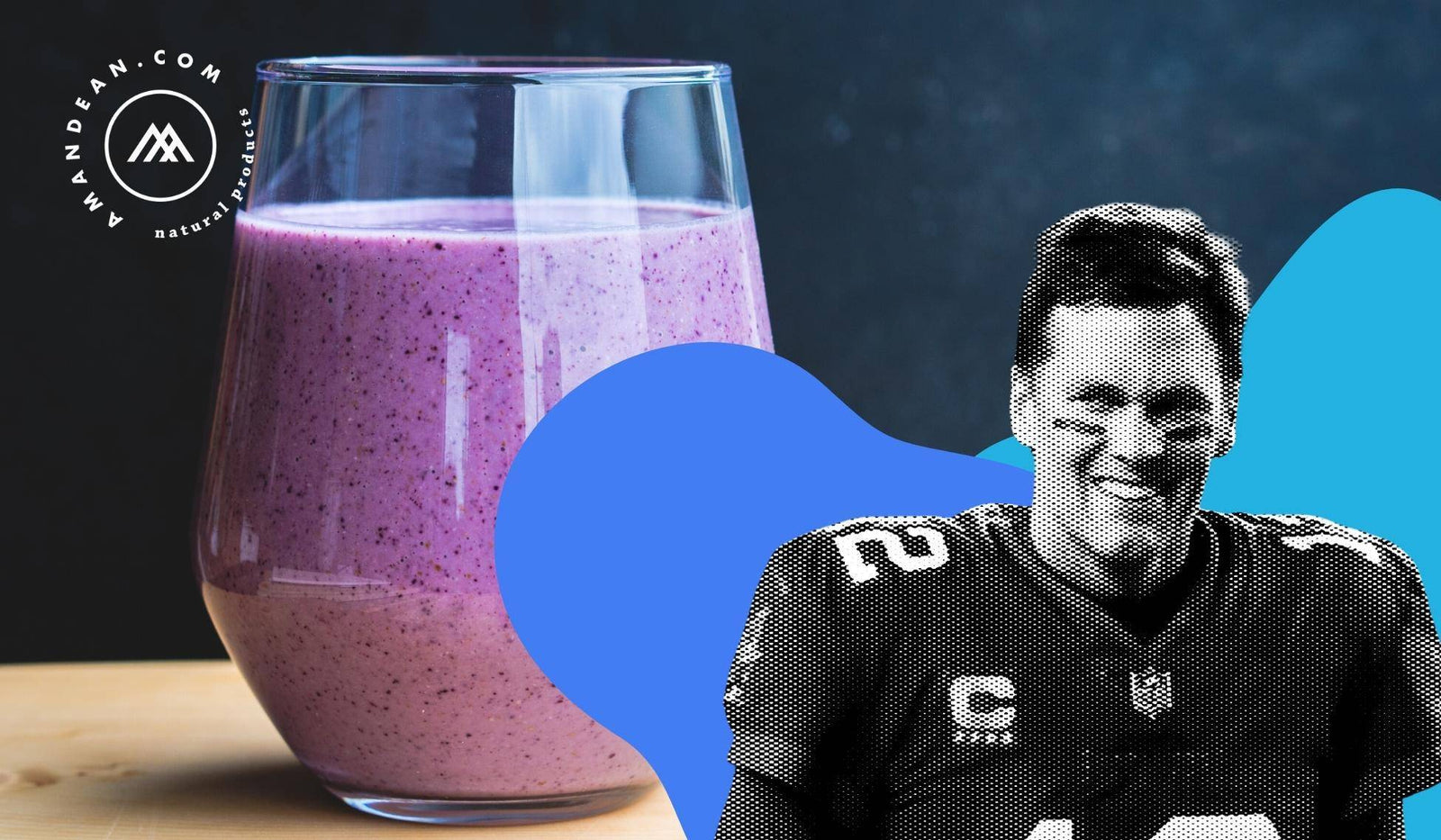Your Cart is Empty

November 07, 2022 4 min read
No matter where you're from or what team you root for, there's really no denying that Tom Brady is one of the G.O.A.T. (greatest of all time). That's why we were so curious about the seven-time SuperBowl champion's diet, exercise routine, and, of course, Tom's favorite recipe for an *off-season* morning smoothie! Here's what we love about it.
Before we get into the ingredients of Tom Brady's breakfast smoothie, let's focus on why we love it as a whole -- it's high in protein! We all know that protein is a staple in athletes' diets, so it's no surprise that it makes a major appearance in QB Tom Brady's. Protein is the most important macronutrient for building muscle and enhancing athletic performance. When you consume protein, your body breaks down its amino acids, which are then used to build everything from new muscle tissue to organs and hair.

In order to build new muscle, the body needs to create more muscle protein than it breaks down. For the athlete that is constantly burning up energy, getting enough protein through diet is absolutely crucial. You bet Tom Brady's diet is filled with protein! Consuming protein after a workout decreases muscle protein breakdown, increases muscle protein synthesis, restores glycogen levels, and speeds up recovery. It’s recommended that you consume 0.14–0.23 grams of protein per pound of body weight within 30-60 minutes after a workout, to maximize its benefits. Tom's smoothie contains 34 grams of protein alone, as well as many other important nutrients! In terms of a macronutrient split for bulking up, the ideal breakdown is 40 percent protein, 30 percent healthy fat, and 30 percent carbs.
But muscle growth isn't the only benefit of a high-protein diet! Protein is extremely filling. Consuming protein, especially lean protein sources like chicken breast or protein powder, can help keep cravings at bay. This could ultimately lead to weight loss. Protein can also support bone health and strength, boost metabolism, and lower blood pressure.

Tom graciously shared some of the fuel that may help him maintain his G.O.A.T. status! On the TB12 Method App (a performance lifestyle brand co-founded by Tom Brady and his body coach Alex Guerrero), Tom shared the recipe for his famous breakfast smoothie. Here it is:
Here's what we love about this recipe. Firstly, water and electrolytes always come before Tom Brady's morning smoothie! Tom kicks off his mornings with about 20 ounces of water. Hydrate first, fill up after! Secondly, this ain't your typical peanut butter banana smoothie. Nearly every ingredient packs in protein, flavor, and other crucial nutrients. The frozen blueberries provide a good amount of antioxidants to keep inflammation low after a workout (or SuperBowl win, no biggie). The hemp milk, made from hemp seeds, is also a protein-rich ingredient that you don't see in your typical morning routine. Healthy fats, calcium, and vitamins A, D, and E are provided by the almond and almond butter.

Here's what we think could be improved. First of all, we’re a bit surprised that Tom and his team went for pea protein. Though this up and coming protein source is great for vegans, compared to other protein sources, it’s lacking. Collagen, for example, typically contains about 40 calories, 10 grams of protein, and no carbohydrates or fat in each serving. Pea protein, on the other hand, contains about 80 calories, 15 grams of protein, 1 gram of carbohydrates, and 1.5 grams of fat per serving. Given that this smoothie recipe contains about 664 calories, 40g protein, 54g carbs (13g fiber), and 36g fat, choosing collagen over pea seems like a great way to increase protein while shaving down calories. Another issue we found was the price. While hemp milk is extremely nutritious, it's pretty expensive. If you don't have hemp milk on hand, substituting it with more almond milk is fine! Lastly, we're guessing that Tom added chia seeds in hopes of adding some omega-3s to the recipe. Unfortunately, chia seeds are not a reliable source of omega-3s. Instead, try a vegan omega-3 supplement made from algal oil.
As far as we're concerned, this smoothie is a winner. Maybe even one of the G.O.A.T.
Protein is the most important macronutrient for building muscle and enhancing athletic performance
In terms of a macronutrient split for bulking up, the ideal breakdown is 40 percent protein, 30 percent healthy fat, and 30 percent carbs
Consuming protein, especially lean protein sources like chicken breast or protein powder, can help keep cravings at bay
Collagen, as opposed to pea protein, typically contains about 40 calories, 10 grams of protein, and no carbohydrates or fat in each serving
Unfortunately, chia seeds are not a reliable source of omega-3s; instead, try a vegan omega-3 supplement made from algal oil

October 17, 2025 8 min read
Find out why creatine is better for vegans! Boost your wellness game and unlock peak performance with Amandean's premium supplements today.

October 16, 2025 7 min read
Learn whether collagen in coffee is just another wellness fad. Examine the facts, benefits, and how to use collagen in coffee for beauty and joint support.

September 22, 2025 9 min read
Unlock the full benefits of creatine for women. Boost energy, beauty, and brainpower with Amandean’s clean formulas.